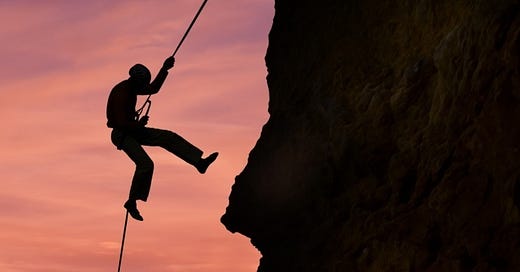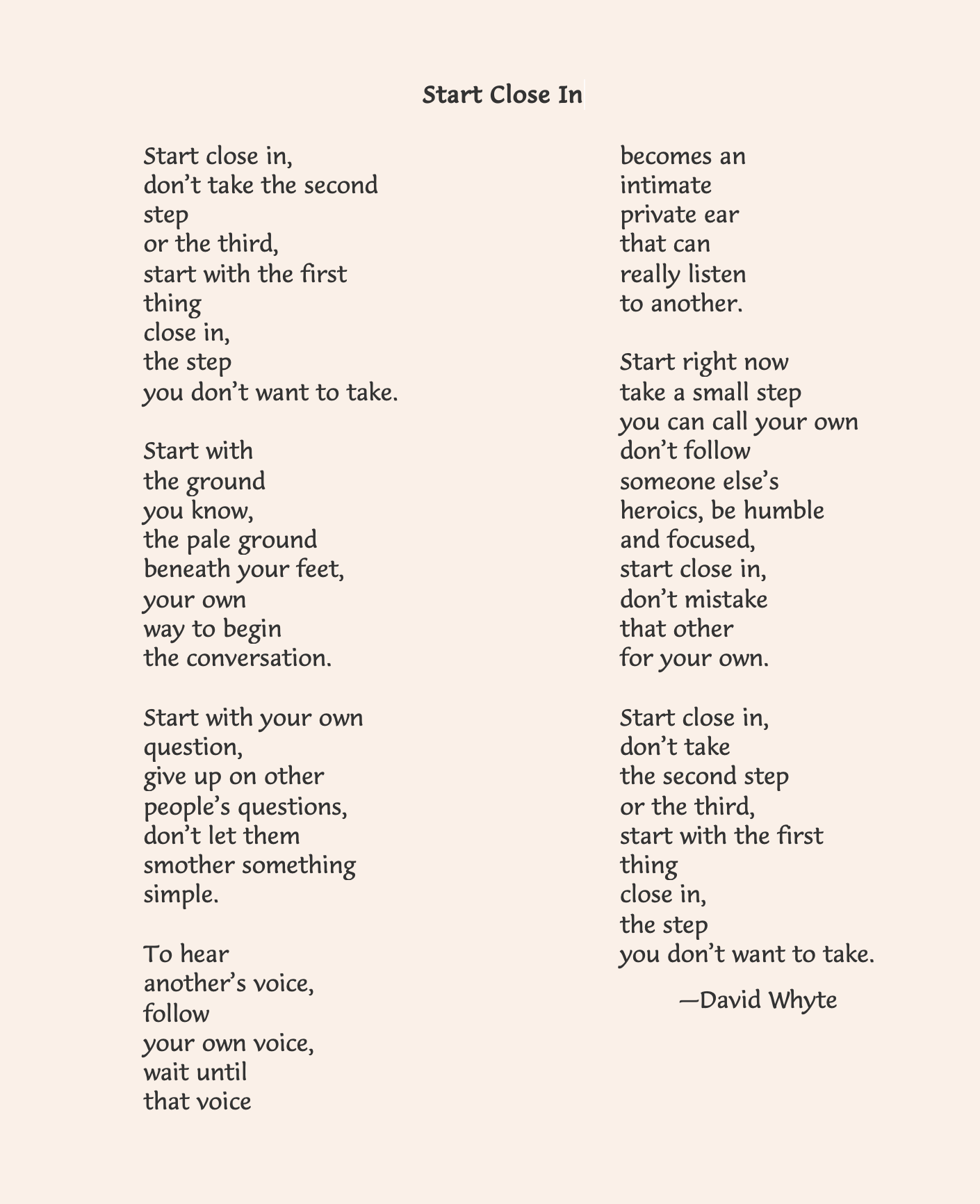"If You Can't Get Out of It, Get Into It!"
Stepping into our fears and finding ground to stand on, one small step at a time...
I. In my mid-forties, bogged down in midlife misery, I went on an Outward Bound program hoping to shake things up. For reasons I don’t recall, I chose the week-long course at Hurricane Island off the coast of Maine. Next time, believe me, I’ll choose a course at Happy Hollow or Pleasant Pasture.
On the fourth day, I faced the challenge I feared most: rappelling. After some instruction, one of our guides backed me up to the edge of a cliff 110 feet above the ground. He attached a very thin rope to a rig around my midsection—a rope that looked seriously tattered to me—and told me to go on down.
“Remember, you have to lean back and get your legs perpendicular to the cliff face so your feet get traction on the rock. It’s counter-intuitive, but it works.” I knew he was wrong, of course. I knew it was imperative to keep my body close to the rock and avoid all that empty space. So I did it my way—and slammed into a ledge a few feet down with bone-and-brain-jarring force.
The guide said, “I don’t think you’ve quite got it.” “Right,” said I, being in no position to disagree. “Tell me again what I’m supposed to do.” “Lean way back,” said he, “then take the next step.” Somehow I did it and, mirabile dictu, it worked. I leaned back into empty space, eyes fixed on the heavens in prayer, made the smallest possible moves with my feet, and began inching down the cliff, gaining confidence with each tiny step.
Halfway down and a lifetime later, a second guide called up from below: “Parker,” she shouted, “stop and take a look at what’s just below your feet.” I was headed towards a cavity in the rock face. I’d have find a way around that hole, which meant abandoning the line of descent I’d just begun to get comfortable with. I froze, paralyzed with fear, certain that changing course would be the death of me.
The second guide let me hang there, petrified, for who knows how long. Then she said, “Parker, is anything wrong?” I know exactly what I said in that moment of terror because a couple of people who were there still remind me about it. In the whiny, self-pitying voice of an adolescent boy I said, “I don’t want to talk about it.”
“Well,” said the second guide, “I guess it’s time you learned the Outward Bound motto.” “Oh, keen,” I thought. “I’m about to die, and she’s giving me a motto!”
Then she spoke ten words whose impact I feel to this day: “If you can’t get out of it, get into it!” That’s when I learned what “bodily knowledge” is. Her words bypassed my quarrelsome mind and mulish emotions. They went directly into my body which, in its wisdom, knew that in was the only way out of my dilemma. Without hesitation, my feet started moving, one tiny step at a time, and soon enough I found myself safe on the ground.
II. Bodily knowledge is etched into the flesh, so the lesson I learned that day is visceral, not metaphorical. It has served me well in dealing with personal and professional impasses that can’t, in good conscience, be evaded. Today it offers guidance for my political life as well.
Our D.C. overlords have backed us over the edge of constitutional democracy and left us dangling above the bottomless pit of tyranny. This time, the rope is truly tattered. For months now, millions of us who care about love, truth, and justice have been clinging to threads, watching with fear and loathing as the rule of law is trashed, academic freedom and science undercut, the economy treated like a game of pickup sticks, the social safety net sliced and diced, political disagreements criminalized, and authoritarians abroad cut in on self-serving “deals” while long-time friends and allies are dissed.
The only way to arrest this free fall and find our way to solid ground is for millions of us to start speaking up, despite our fears. We have to take that first small step that will eventually return us to political sanity. What exactly that step might be will vary from person to person. But there’s guidance for all of us in David Whyte’s classic poem, “Start Close In,” a poem that seems simple but rewards a careful reading:
III. Whyte’s advice to take our first step toward “the thing close in” may seem so obvious as to be a waste of words—until we realize that what’s closest to us is what has us frozen in place. In our deeply divided nation, many of us who want to go public with our fears and hopes for democracy are surrounded by a MAGA culture that regards its critics as traitors. So that first step is a step we don’t want to take, one that’s likely to get us crosswise with close-in family members, friends, neighbors and others whom we value. But only in taking that first step can we be liberated from fear—and the blessings of liberation always outweigh the liabilities.
Every day, we can ask ourselves what’s “close in” for us? What’s the thing within easy reach that we’d like to do but never quite get around to? What’s the tiny step that’s ours alone to take that will break us out of fear and give us more control over our own destinies?
Maybe it’s a conversation with a sibling, neighbor, or colleague who sees the world differently than we do. Maybe it’s a call to an elected official with whom we disagree on a matter of policy. Maybe it’s a visit with someone in religious leadership whom we expect to model a life of forthright humanity. Maybe it’s a letter to the editor in which we declare our convictions in ways that won’t sit well with others.
Whatever it is, it will be easy to spot: it’s that step close in, “the step you don’t want to take.” And once we take it, that step will be followed by another and another and another until we reach solid ground, as I learned on Outward Bound.
The internet is full of advice about how to conduct creative encounters across lines of divides, and much of it is wise. But there is genius in these lines from David Whyte’s poem: “Start with your own question, give up on other people’s questions, don’t let them smother something simple.” And “don’t follow someone else’s heroics, be humble and focused, start close in, don’t mistake that other for your own.”
Whatever step you take in defense of democracy, do it authentically and vulnerably—wear your identity, your integrity, your heart on your sleeve. If you can’t show up as your true self in a relationship, small or large, what’s that relationship worth? And if you show up animated by the “better angels” of your nature, who knows what the outcome might be? It’s time to remember the words of the classic civil rights anthem, “Keep on a-walkin’, keep on a-talkin’, marching up to freedom land.”
Forty years ago, faced with a crisis on Outward Bound, I said “I don’t want to talk about it.” Today I know that all of us must talk about it. Forty years ago, I wanted someone to rescue me. Today I know that we’re responsible for our own fates. Forty years ago, I was too scared to risk taking the first steps toward solid ground. Today I know that the real risk is to live your life frozen in fear of falling. There’s no need to hang suspended over the void when, step-by-step and hand-in-hand, we can find ground on which to stand.
P.S. If you want to respond to this piece, please consider sharing the story of “first steps” you have taken or intend to take as a citizen of our imperiled democracy. There might well be someone out there who will be inspired by what you have to say. Thanks!
[NOTES: My 10 books are HERE and HERE. The Center for Courage & Renewal is HERE. David Whyte’s poem is HERE, and you can hear him read it HERE. I post on Substack once a week, as time and energy allow. Free as well as paid subscriptions are welcome—both will always have access to everything I post.]







I find the best small step is to be specific about one topic rather than 'the world is falling".When I talk with someone with an opposing view I think about what is important to them and ask their thoughts on a related topic. For example, a friend who backs Trump worries about privacy. I asked how he feels about DOGE having access to our information. It begins a conversation that is smaller. Another person who is involved in the supply chain it becomes - how are the tariffs impacting your work? Stay on specific topics. General questions spin out of control easily.
Recently read the book “On Tyranny” by Timothy Synder. Its a short read with a big impact. Asked my husband to read it too- would love for my 18yo son to read it. His words are helping me to name where we are as a nation, with historical context of how to resist- primarily how to show up. In many ways showing up feels risky- having family conversations is one way to strengthen our resolve and stand together. Carrie Newcomer proposes two daily questions- “What us mine? And who will go with me?” This is where I am starting. Step one.